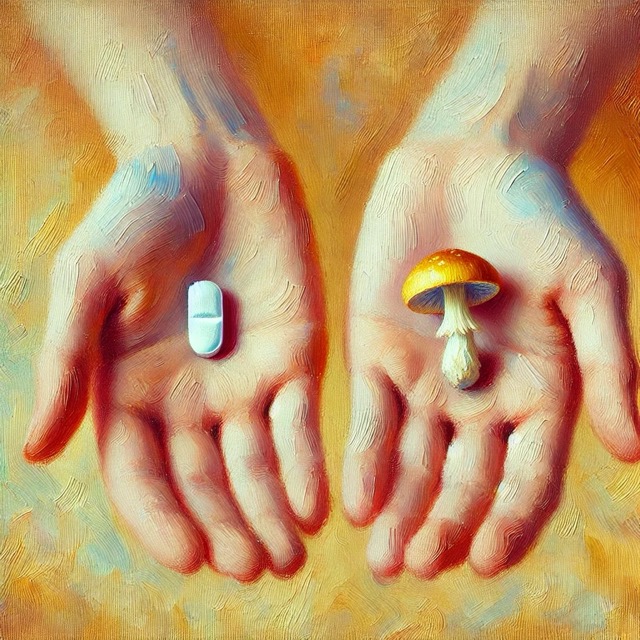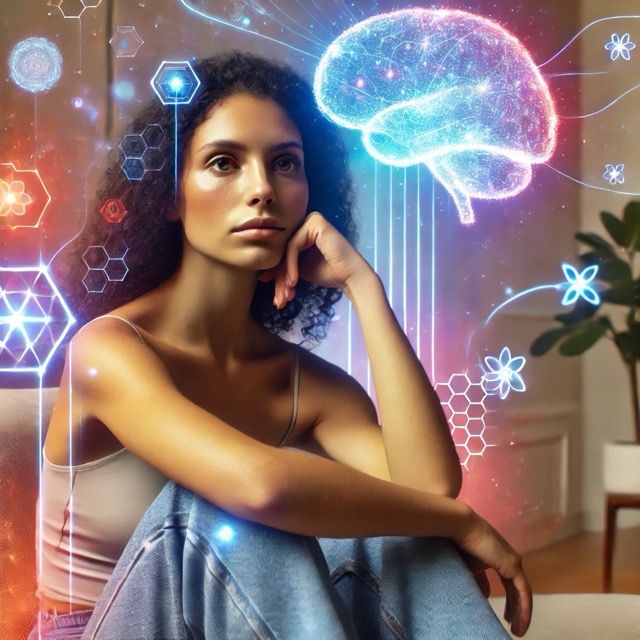New Study: Psilocybin Shows Promise as Alternative to SSRIs

The treatment of depression has long relied on conventional medications, like SSRIs, but recent research is opening up new possibilities. A groundbreaking study from the Centre for Psychedelic Research at Imperial College London explored psilocybin, the active compound in psychedelic mushrooms, as a treatment for moderate to severe depression. This article will break down the study’s findings, what they mean for those dealing with depression, and how this could affect the future of mental health treatments like microdosing and macrodosing.

What Was the Study About?
This study compared psilocybin therapy with escitalopram (Lexapro), a well-known SSRI used to treat depression. The participants were given either two high doses of psilocybin, spaced three weeks apart, or daily doses of escitalopram over six weeks. Both groups also received psychological support throughout the study. The goal was to see which treatment provided better long-term relief from depressive symptoms and improvements in overall mental health.
Key Takeaways
After six months of follow-up, both psilocybin and escitalopram showed sustained improvements in depression. However, the psilocybin group experienced more significant enhancements in areas that might be even more impactful than symptom relief alone.
📉 Depression Scores: At six months, both groups showed reduced symptoms of depression, but there wasn’t a significant statistical difference between them.
🌞 Improved Functioning and Well-being: The psilocybin group outperformed the escitalopram group in areas like work and social functioning, connectedness to others, and finding greater meaning in life.
🌈 Psychological Connectedness: The psilocybin group reported feeling more connected to themselves, others, and the world around them, which could play a critical role in long-term mental health improvement.
🍄 Meaning in Life: Psilocybin therapy helped individuals find more meaning in life, which often leads to a sense of fulfillment and emotional resilience.
The results hint at something deeper than just alleviating symptoms: psilocybin may help restore a sense of connection to the world, others, and oneself—a critical component often missing in traditional treatments.
What This Means for People Suffering from Depression
If you’ve struggled with depression or know someone who has, this study offers a glimmer of hope. While SSRIs like escitalopram are effective for many, they often come with side effects such as weight gain, emotional numbness, or fatigue. Additionally, they require long-term daily use to maintain effectiveness. Psilocybin therapy, on the other hand, involved only two high-dose sessions yet showed lasting improvements for many patients over six months.
What makes psilocybin therapy unique is its ability to offer more than just symptom relief. The improvements in work and social functioning, meaning in life, and psychological connectedness suggest that psilocybin helps to heal more holistically, addressing the root causes of what many people with depression feel: disconnection and lack of purpose.
For those looking for alternatives to conventional antidepressants, or for whom antidepressants haven’t worked, this research is a promising development. It indicates that psychedelic therapies could provide a new way of treating depression, especially for people who haven’t responded to typical medications.
What About Microdosing?
While this study specifically focused on macrodosing—taking a high dose of psilocybin under controlled, therapeutic conditions—it also has implications for the growing interest in microdosing. Microdosing involves taking very small, sub-hallucinogenic amounts of psychedelics, typically every few days, in hopes of boosting mood, creativity, or focus. However, research on microdosing is still in its early stages.
The study didn’t directly address microdosing, but it suggests that the neuroplasticity-enhancing effects of psilocybin—the brain’s ability to rewire itself—could have benefits even at lower doses. While many people have shared anecdotal success stories about microdosing, we still need more scientific data to confirm its effectiveness, especially in treating depression.
For now, those considering microdosing should be cautious, especially if they have a history of mental health issues, and always consult with a healthcare provider.
The Bigger Picture: A New Future for Mental Health?
This study contributes to a growing body of research suggesting that psychedelics like psilocybin could revolutionize how we approach mental health care. Traditional antidepressants can be life-saving, but they don’t work for everyone, and many come with significant drawbacks. Psilocybin therapy presents an alternative that not only addresses symptoms quickly but also promotes deeper, more holistic healing.
The study’s results point to something essential: while depression often robs people of their sense of connection, meaning, and vitality, psilocybin seems to help restore those lost parts of the self. For many, this could be the missing piece in mental health treatment—a way to reconnect not just with life, but with joy, purpose, and the people around them.
Insights for Women and Mothers
For women, especially mothers, who often shoulder the mental, emotional, and physical burdens of caring for others, the findings of this study are particularly powerful. Mental health challenges like postpartum depression, anxiety, or burnout can leave mothers feeling disconnected, overwhelmed, or like they’ve lost a part of themselves.
This research offers hope that alternative therapies like psilocybin could help rebuild that connection—not just to themselves, but to their families, communities, and the world. While motherhood is one of the most profound experiences a woman can have, it can also be incredibly isolating and exhausting. Depression or anxiety can compound those feelings of isolation. Psilocybin’s ability to foster a sense of connectedness and meaning could be a game-changer for mothers seeking not just relief from depression but a deeper sense of well-being.
Another point to consider is how this new treatment option may align with women’s desires for holistic and integrated approaches to health. Many women are seeking alternatives to conventional medical treatments, not out of distrust, but because they want something that addresses their whole being—mind, body, and soul. Psilocybin therapy, with its combination of psychological and emotional healing, may resonate with those who feel that modern medicine often overlooks the human experience.
What Should You Do with This Information?
If you or someone close to you is struggling with depression, here are some practical steps to consider:
📰 Stay Informed: As psychedelic research continues, it’s crucial to stay updated on the latest studies and findings. This field is rapidly evolving, and new treatments may become more widely available in the near future.
🧑🏻⚕️ Consult Professionals: While the study’s findings are promising, psilocybin therapy is still not widely available, and it’s important to consult healthcare providers about any treatment decisions. If you’re considering alternative therapies, talk to your doctor or a licensed therapist familiar with psychedelic-assisted treatments.
📣 Advocate for Mental Health Options: Whether you’re personally interested in psychedelic therapies or not, advocating for a broader range of mental health treatment options benefits everyone. The more options available, the more likely people will find the care that works best for them.
🧘🏽♀️ Focus on Holistic Healing: Even if psychedelic therapy isn’t accessible right now, there are other ways to foster the same kind of connectedness and meaning. Practices like mindfulness, yoga, meditation, and time spent in nature can all help restore that sense of connection that depression often strips away.
Final Thoughts
The latest study on psilocybin therapy shows that it’s not just about alleviating symptoms of depression—it’s about fostering a deeper sense of connection, meaning, and well-being. For those who’ve struggled to find lasting relief with traditional treatments, this could be a significant shift in how we approach mental health.
As research into psychedelics continues to grow, we may see a future where therapies like psilocybin become more widely available and offer new hope to people dealing with depression and anxiety. For women and mothers, this represents an exciting possibility for healing that addresses not just the mind but the whole self.
Effect of psilocybin versus escitalopram on depression symptom severity in patients with moderate-to-severe major depressive disorder: observational 6-month follow-up of a phase 2, double-blind, randomised, controlled trial; Erritzoe, David et al.; eClinicalMedicine, Volume 0, Issue 0, 102799





Responses